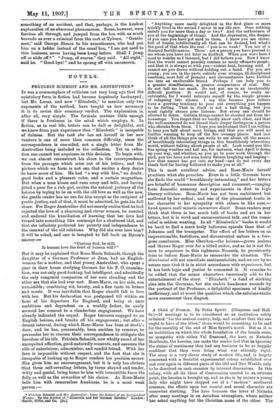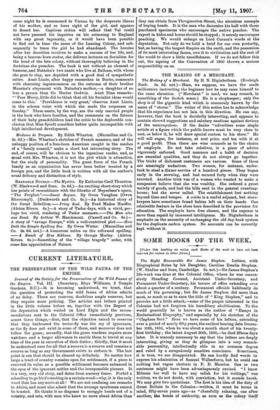A Child of Promise. By Netta Syrett. (Chapman and Hall.
6a.)—If marriage is to be considered as an institution solely ordained "for the mutual society, help, and comfort that the one ought to have of the other," there would be something to be said for the morality of the end of Miss Syrett's novel. But as it is an institution on which the whole foundation of the family rests, no sympathy with either Val Desmond, the hero, or Natasha Heathcote, the heroine, can make the reader feel that in ignoring the claims of matrimony they load any business to be so happily confident that they were doing what was ethically right. The story is a very clever study of modern life, and is largely concerned with a Socialist experimental colony established over and over again in different parts of the Old and New Worlds, only to be dissolved on each occasion by internal dissensions. In this colony, with all its ideas of Communism carried to an extreme point, the heroine is brought up, and as she is by nature a young lady who might have stepped out of a "modern" mediaeval romance, the effects upon her mental and moral character are somewhat startling. The hero becomes the lover of Natasha after many meetings in an Arcadian atmosphere, where neither has asked anything but the Christian name of the other. The same night he is summoned to Vienna by the desperate illness of his mother, and so loses sight of the girl, and appears to desert her. Captious critics will reflect that Val could not have pursued his inquiries on his returning to England with any great ingenuity, or it would have been possible to find out in time the name of the Lancing Colony, and sub- sequently to trace the girl he had abandoned. The heroine after her desertion resolves to make a success of her life, and. being a heaven-born orator, she delivers lectures on Socialism for the head of the late colony, without thoroughly believing in the doctrines she preaches. The book is not without an element of humour, and Natasha's two aunts who live at Bathem, with whom she goes to stay, are depicted with a good deal-of sympathetic satire. Aunt Lizzie, after happy researches in Burke, comments with charming ingenuousness on the outcome of their brother Maurice's elopement with Natasha's mother,—a daughter of no less a person than Sir Hector Godwin. Aunt Nina remarks: " • Poor Merry, little did he think that all his Socialist ideas would come to this.' Providence is very great,' observes Aunt Lizzie, in the solemn voice with which she made the responses on Sunday." These aunts, by the way, are the only married people in the book who have families, and the comments on the fatness of their baby grandchildren lead the critic to the deplorable con- clusion that Miss Syrett considers babies quite incompatible with high intellectual development.











































 Previous page
Previous page